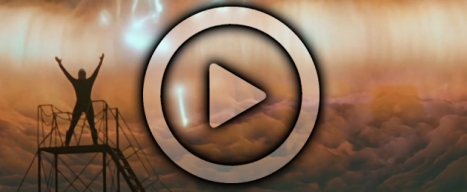There is a solid argument to be made for the Marvel Cinematic Universe as blockbuster television series that only releases three or four films in a given year.
There’s a lot of evidence to support this argument, perhaps most notably the directors chosen for “phase two” of the grand experiment. Joss Whedon might have directed Serenity and Much Ado About Nothing, but he remains known for his game-changing work on television series like Buffy: The Vampire Slayer, Angel, Firefly and Dollhouse. Removing Patty Jenkins from Thor: The Dark World and replacing her with Alan Taylor only reinforced this sense. Drafting in the Russo Brothers from Community to direct Captain America: The Winter Soldier cemented the notion.

Purple reign.
Indeed, the elevation of the Russo Brothers within the Marvel Studios hierarchy with Captain America: Civil War and with Avengers: Infinity War suggests the obvious similarities between managing the sprawling continuity of the shared cinematic universe and the day-to-day management of a television show, where individual instalments might be credited to individual authors, but it is also important to maintain consistency of tone and vision across the entire line. Infinity War suggests the sort of organisational ability associated with long-form television storytelling more than any single cinematic narrative.
There are moments in which this approach works. Infinity War is full of knowing winks and callbacks, allusions and references. There is a sense of set-up and pay-off to certain threads and arcs seeded across the eighteen previous films within the established brand. Characters get emotional scenes that play upon established relationships and dynamics, which are clearly articulated within the film itself, but building off years of watching (and rewatching) these actors play off one another in these roles. There is an undeniable weight to Infinity War that simply would not be possible without that television storytelling style.

Avengers assembled.
At the same time, there are reminders of the limitations of this approach, of the challenges of balancing individual stories with a larger plan for the narrative universe in which they unfold. This is particularly notable because Marvel Studios recently shifted towards a more director-friendly approach in some of its standalone productions. Guardians of the Galaxy and Guardians of the Galaxy, Vol. 2 are both undeniably James Gunn productions. Black Panther could only have come from Ryan Coogler. Thor: Ragnarok worked as well as it did because of the unique directorial stylings of Taika Waititi.
Watching Infinity War, it becomes clear how far these directors deviated from the established style sheet, and the difference in approach between these directors and the Russo Brothers. It occasionally feels like Infinity War was constructed by people who watched those movies, without understanding why they worked as well. There is a tonal awkwardness when these characters are woven back into the fabric of the shared universe, in a manner that is occasionally unquantifiable but sometimes fundamental.

Guardians… Get In There?
Infinity War is good, clean fun. Perhaps too good and too clean. In order put the jigsaw pieces together, all of the rough edges have been sanded off. Anything that might generate friction has been stripped away, creating the impression of a very smooth and very functional storytelling engine. Midway through the film, Thor ruminates upon the existence of fate and how it has led him towards this particular moment and beyond to a greater purpose. Doctor Steven Strange perceives one single happy ending to this crisis.
There is a sense that Thor and Strange perceive the vast narrative machine of Infinity War working around them. It is an impressive machine, if a somewhat inhuman one.

Things look pretty Stark.
Continue reading →
Filed under: Non-Review Reviews | Tagged: avengers, avengers: infinity war, comic books, death, endings, film, Game of Thrones, mortality, Movies, non-review review, review, spoilers, thanatos, thanos | 15 Comments »

































